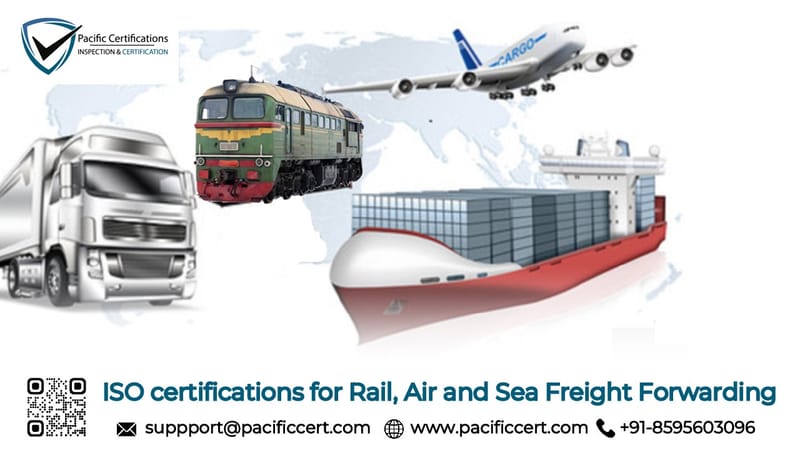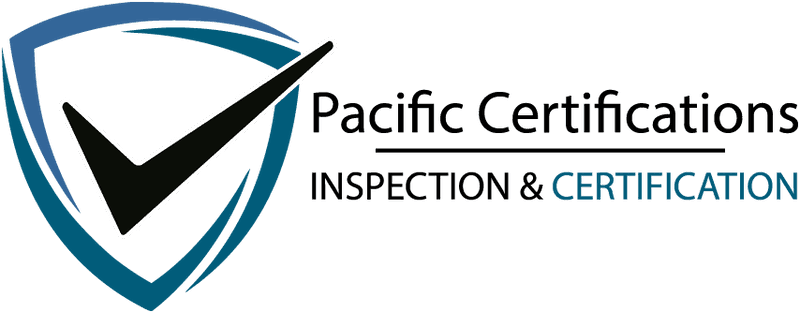ISO Certifications for Rail, Air and Sea Freight Forwarding, Requirements and Benefits

In an increasingly globalized world, the transportation and logistics sector is vital to the smooth flow of goods and services across borders. Rail, air, and sea freight forwarding sectors are at the forefront of international trade, responsible for the movement of goods on a vast scale. As the demand for efficiency, safety and reliability grows, companies in this sector must adopt international standards to maintain their market reputation and to ensure customer satisfaction.
For rail, air, and sea freight forwarding, ISO certifications are essential for ensuring the efficient and safe transportation of goods across long distances and international borders.
The logistics and freight forwarding industry faces unique challenges, including managing complex supply chains, international regulations, ensuring cargo safety and minimizing environmental impact. ISO certifications enable freight companies to mitigate risks and enhance customer satisfaction by adhering to globally accepted best practices.
If you're seeking ISO certification for your Rail, Air, or Sea Freight Forwarding operations, reach out to us today at [email protected] or call +91-8595603096 to start your journey.
Applicable ISO Standards for Rail, Air, and Sea Freight Forwarding Operations
There are several ISO standards applicable to the forwarding sectors. Below are some of the most commonly implemented ISO standards in these industries:
- ISO 9001: Quality Management Systems (QMS)
ISO 9001 is the most widely recognized standard for quality management. It provides a framework for companies to ensure that their services consistently meet customer expectations and comply with regulatory requirements. - ISO 14001: Environmental Management Systems (EMS)
ISO 14001 helps companies manage their environmental responsibilities systematically, which is crucial in sectors like air and sea freight where fuel consumption and emissions are significant concerns. - ISO 45001: Occupational Health and Safety Management Systems (OHSMS)
ISO 45001 helps organizations implement robust safety protocols to protect employees and reduce work-related risks. - ISO 27001: Information Security Management Systems (ISMS)
ISO 27001 provides a framework for managing information security, ensuring that data related to shipments, customers, and operations are protected from cyber threats and breaches. - ISO 50001: Energy Management Systems (EnMS)
ISO 50001 helps organizations implement systems that improve energy performance, reduce energy costs, and minimize the environmental impact of their operations.
Click here to find out more applicable standards to your industry
Ensure your Rail, Air, or Sea Freight Forwarding company meets international standards. Contact us at [email protected] or give us a call at +91-8595603096 for expert ISO certification services.
How We Can Help
At Pacific Certifications, we are dedicated to providing reliable auditing and certification services to help your business achieve ISO certification. While we do not offer consultancy, training, or implementation services, we specialize in helping companies meet the rigorous requirements of ISO standards by conducting thorough audits and issuing ISO certifications.
Our team of experienced auditors works closely with your organization to ensure compliance with relevant ISO standards. By partnering with Pacific Certifications, you can rest assured that your certification process will be handled with the utmost professionalism and attention to detail. We take pride in our ability to help rail and sea freight forwarding businesses to demonstrate their commitment to quality and sustainability through ISO certification.
Looking to enhance your Freight Forwarding services with ISO certification? Get in touch with us at [email protected] or call +91-8595603096 for professional certification assistance.
Requirements of ISO Standards for Rail and Sea Freight Forwarding
Each ISO standard comes with specific requirements that freight forwarding companies must meet to achieve certification. Here are some of the key requirements:
- ISO 9001: Quality Management: Requires organizations to implement a quality management system that includes customer focus, leadership commitment, process management, risk-based thinking, and continuous improvement. Regular internal audits and management reviews are necessary to maintain compliance.
- ISO 14001: Environmental Management: Requires organizations to assess their environmental impact, set environmental objectives, and implement processes to reduce environmental footprint. Compliance with legal and regulatory requirements is essential, along with ongoing performance evaluation.
- ISO 45001: Occupational Health and Safety: Requires organizations to establish a framework for managing health and safety risks, including hazard identification, risk assessment, and incident management. Employee involvement and training are crucial for maintaining a safe work environment.
- ISO 28000: Supply Chain Security: Requires organizations to implement security controls that mitigate risks to the supply chain, including physical security, personnel security, and emergency preparedness. Regular security assessments and compliance with security regulations are vital.
- ISO 27001: Information Security: Requires organizations to protect their information assets by implementing a comprehensive information security management system. This includes risk assessment, security controls, incident response plans, and regular security audits.
- ISO 50001: Energy Management: Requires organizations to establish an energy policy, set energy performance goals, and implement procedures to monitor and improve energy efficiency. Regular energy reviews and continuous improvement are key aspects of the standard.
Need ISO certification for your Rail, Air, or Sea Freight Forwarding business? Contact Pacific Certifications at [email protected] or +91-8595603096 to get started today.
Benefits of ISO Standards for Air, and Sea Freight Forwarding
- Ensures consistent service quality that meets customer expectations, increasing customer loyalty.
- Streamlines business processes, reducing waste and optimizing resource use.
- Helps companies stay compliant with international quality regulations, reducing legal risks.
- Encourages a risk-based approach to decision-making, identifying potential issues before they arise.
- Fosters a culture of continuous improvement, allowing businesses to adapt to changing market conditions.
- Improves resource efficiency, potentially lowering operational costs related to energy and materials.
- Demonstrates a commitment to environmental sustainability, improving stakeholder relations and attracting environmentally-conscious customers.
- Supports long-term business sustainability by reducing environmental risks and promoting eco-friendly practices.
- Identifies potential hazards and implements preventive measures, reducing work-related injuries and fatalities.
- Ensures compliance with national and international health and safety standards.
Each of these ISO standards offers distinct advantages that can help rail and sea freight forwarding companies improve their operations and meet regulatory requirements.
Elevate your Rail, Air, or Sea Freight Forwarding operations with ISO certification. Contact us at [email protected] or +91-8595603096 to learn how we can help.
Market News
This year, the freight forwarding industry is undergoing significant changes due to evolving customer expectations, technological advancements, and regulatory pressures.
The rise of green logistics, driven by stricter environmental regulations and customer demand for sustainable services, is reshaping the industry. Rail, air, and sea freight forwarding companies are increasingly turning to ISO certifications to showcase their commitment to sustainability and operational excellence.
The adoption of digital technologies such as artificial intelligence (AI), Internet of Things (IoT), and blockchain is transforming supply chain operations, enhancing transparency, and improving efficiency.
In 2024, companies that invest in ISO certifications like ISO 27001 for information security and ISO 50001 for energy management are better positioned to navigate these changes and meet the demands of the modern logistics landscape.
Ready to achieve ISO certification for your Freight Forwarding company? Reach out to [email protected] or call +91-8595603096 for more information on our certification services.
What is Certification Process
Achieving ISO certification involves several key steps:
- Gap Analysis (Optional): Before starting the certification process, some companies choose to conduct a gap analysis to identify areas that need improvement to meet ISO standards.
- Documentation Review: The certification body (Pacific Certifications) reviews the organization’s documentation to ensure that it complies with the requirements of the relevant ISO standard.
- Initial Audit (Stage 1 Audit): During this phase, we perform an initial audit to assess your organization’s readiness for certification.
- Certification Audit (Stage 2 Audit): The certification audit is a thorough evaluation of your organization’s compliance with the ISO standard. Our auditors will assess your processes, procedures, and systems to determine whether they meet the necessary requirements.
- Certification Decision: If the audit is successful, your organization will receive ISO certification. This certification is valid for three years, during which time we will conduct surveillance audits to ensure continued compliance.
- Surveillance Audits: After certification, we will conduct periodic surveillance audits to ensure that your organization continues to meet the requirements of the ISO standard.
- Recertification Audit: After three years, your organization will need to undergo a recertification audit to maintain its ISO certification.
Pacific Certifications is accredited by ABIS, in case you need support with ISO certification for your Rail, Air and Sea Freight Forwarding business, please contact us at [email protected] or +91-8595603096.
FAQs: ISO Certifications for Rail, Air and Sea Freight Forwarding
Q1: What is ISO 9001 certification for freight forwarding?
ISO 9001 is a quality management standard that helps freight forwarding companies ensure that their services meet customer requirements and improve operational efficiency.
Q2: How does ISO 14001 benefit air and sea freight forwarding companies?
ISO 14001 helps air and sea freight forwarding companies reduce their environmental impact by implementing sustainable practices and complying with environmental regulations.
Q3: Is ISO 45001 necessary for freight forwarding companies?
Yes, ISO 45001 is essential for ensuring the health and safety of employees, particularly in high-risk environments like ports, airports, and railways.
Q4: How long does it take to achieve ISO certification?
The certification process typically takes several months, depending on the size and complexity of your organization and its readiness for certification.
Q5: Does Pacific Certifications provide consultancy services?
No, we only provide auditing and certification services. We do not offer consultancy, training, or implementation services.
Read More at: Blogs by Pacific Certifications

